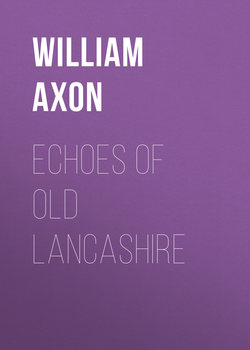Читать книгу Echoes of old Lancashire - Axon William Edward Armytage - Страница 5
What was the First Book Printed in Manchester?
ОглавлениеThe answer to this question is not so obvious as might at first be expected. There were in the Lancashire of Elizabeth’s days two secret presses. From one there issued a number of Roman Catholic books. This was probably located at Lostock, the seat of the Andertons. The other was the wandering printing-press, which gave birth to the attacks of Martin Marprelate upon the Anglican Episcopate. This was seized by the Earl of Derby in Newton Lane, near Manchester. The printers thus apprehended were examined at Lambeth, 15th February, 1588, when Hodgkins and his assistants, Symms and Tomlyn, confessed that they had printed part of a book entitled, “More Work for the Cooper.” “They had printed thereof about six a quire of one side before they were apprehended.” The chief controller of the press, Waldegrave, escaped. In these poor persecuted printers we must recognise the proto-typographers of Manchester. No trace remains of “More Work for the Cooper.” The sheets that fell into the hands of the authorities do not appear to have been preserved. Putting aside the claims of this anti-prelatical treatise, we have to pass from the sixteenth to the eighteenth century. Many tracts and books by local men, and relating to local affairs, were printed before 1719, but that appears to be the date of the first book printed in Manchester. The title page is here reproduced: – “Mathematical Lectures; being the first and second that were read to the Mathematical Society at Manchester. By the late ingenious Mathematician John Jackson. ‘Who can number the sands of the Sea, the drops of Rain, and the days of Eternity?’ – Eccles. i., 2. ‘He that telleth the number of the Stars and calleth them all by their Names.’ – Psalm cxlvii., 4. Manchester; printed by Roger Adams in the Parsonage, and sold by William Clayton, Bookseller, at the Conduit, 1719.” (Octavo.)
The claims of Jackson’s “Lectures” were stated by the present writer in Notes and Queries (see fourth series, iii., 97, and vii., 64), and in his “Handbook to the Public Libraries of Manchester and Salford.” Some further correspondence appeared in Local Gleanings (vol. i., p. 54), and an extract was given from one of William Ford’s catalogues, which, if accurate, would show that there was a local press at work in 1664. Ford has catalogued a book in this fashion: – “A Guide to Heaven from the Word; Good Counsel how to close savingly with Christ; Serious Questions for Morning and Evening; Rules for the due observance of the Lord’s Day. Manchester, printed at Smithy Door, 1664. 32mo.”
Apparently nothing could be clearer or less open to doubt. After a careful look out for the book, a copy has been secured, and is now in the Manchester Free Library. The title reads: – “A Guide to Heaven from the Word. Good counsel how to close savingly with Christ. Serious Questions for Morning and Evening; and rules for the due observation of the Lord’s Day. John 5, 39. Search the Scriptures. Manchester: Printed by T. Harper, Smithy Door.” (32 mo, pp. 100.) There is no date, but the name of Thomas Harper, printer, Smithy Door, may be read in the “Manchester Directory” for 1788, and the slightest examination of the “Guide to Heaven” will show that its typography belongs to that period. From whence, then, did Ford get the date of 1664? If we turn to the fly-leaf the mystery is explained, for on it we read, “Imprimatur, J. Hall, R.P.D. Lond. a Sac. Domest. April 14 1664.” The book, in fact, was first printed in London in 1664, and Thomas Harper, when issuing it afresh, reprinted the original imprimatur, which Ford then misconstrued into the date of the Manchester edition. The book is entered as Bamfield’s “Guide to Heaven” in Clavell’s “Catalogue,” and the publisher is there stated to be H. Brome. Either Francis or Thomas Bamfield may have been the author, but the former seems the more likely. Thomas Bampfield – so the name is usually spelled – was Speaker of Richard Cromwell’s Parliament of 1658, and he was a member of the Convention Parliament of 1660, and was the author of some treatises in the Sabbatarian controversy. Francis was a brother of Thomas, and also of Sir John Bamfield, and was educated at Wadham College, Oxford, where he graduated M.A. in 1638. He was ordained, but was ejected from the Church in 1662, and died minister of the Sabbatarian Church in Pinner’s Hall. He wrote in favour of the observation of the Saturday as the seventh day, and therefore real Sabbath, and whilst preaching to his congregation was arrested and imprisoned at Newgate, where he died 16th February, 1683-4. His earliest acknowledged writing was published in 1672, and relates to the Sabbath question.
The first book printed in Manchester, so far as the present evidence goes, was Jackson’s “Mathematical Lectures,” but it was the fruit of the second printing-press at work in the town.
